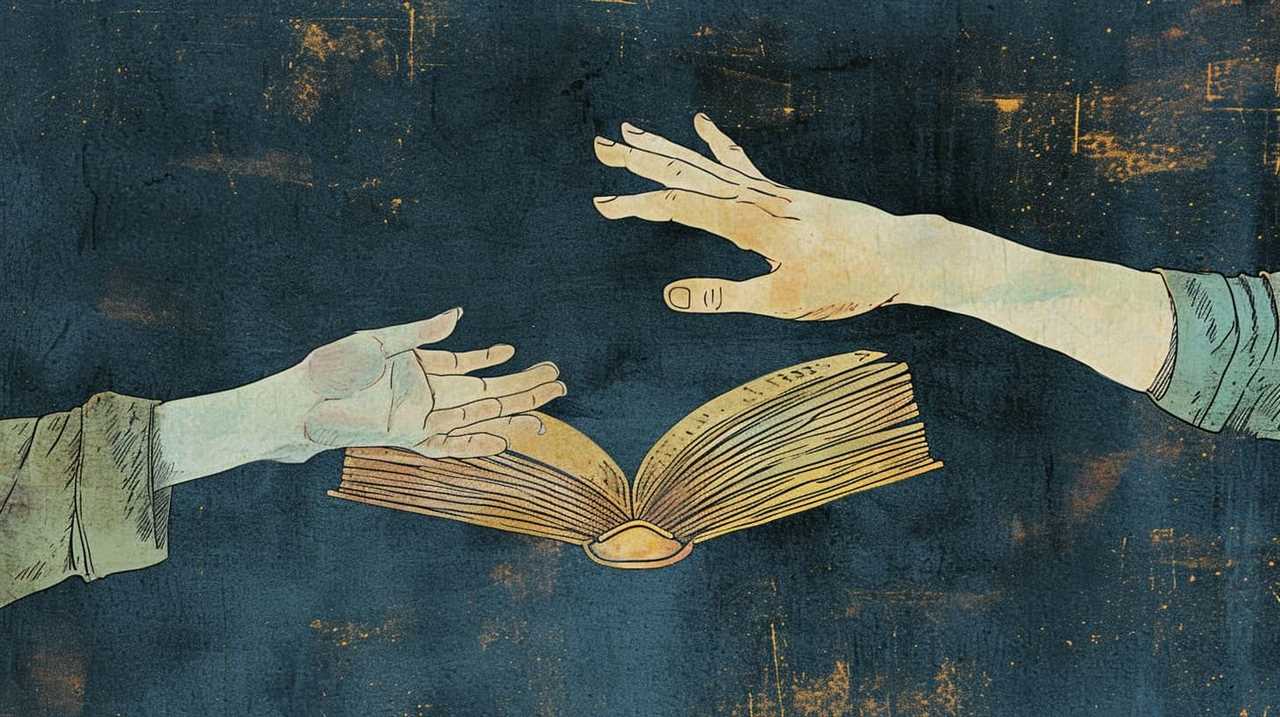Feeling tired of the same old life lessons? Looking for something fresh, something revolutionary? Look no further than classic literature.
In these timeless stories, you’ll discover the power of love and sacrifice, overcoming adversity with resilience, finding your identity through self-discovery, and the importance of friendship and loyalty. But that’s not all.
Classic literature also delves into the depths of embracing change and growth, the pursuit of knowledge and wisdom, the value of perseverance and determination, and even the meaning of life and existence.
It’s a journey that will challenge your thinking, expand your horizons, and leave you with a newfound appreciation for the complexities of the human experience. So grab a book, open your mind, and let classic literature teach you life’s most valuable lessons.

Key Takeaways
- Love in classic literature teaches selflessness and prioritizing the well-being of others.
- Classic literature helps readers navigate their own paths of self-discovery and broadens their understanding of the world.
- Embracing change and growth leads to personal development and self-improvement.
- Classic literature challenges societal norms, encourages critical thinking, and fosters empathy and understanding.
The Power of Love and Sacrifice
One important life lesson you can learn from classic literature is the transformative power of love and sacrifice. Classic literary works often explore the depths of human emotions and relationships, showcasing the profound impact that acts of selflessness and understanding sacrifice can have on individuals and society as a whole.
Love, in its purest form, is a force that transcends personal desires and fosters a sense of selflessness. Characters in classic literature, such as Elizabeth Bennet in Pride and Prejudice or Jane Eyre in the eponymous novel, exhibit this selflessness as they navigate complex relationships and make choices that prioritize the well-being of others. By exploring selflessness, these characters teach us the importance of putting others before ourselves and the transformative power that love can have in our lives.
Sacrifice, on the other hand, is a testament to the strength of our convictions and our willingness to endure hardships for a greater purpose. Characters like Sydney Carton in A Tale of Two Cities exemplify this understanding sacrifice as they make ultimate sacrifices for the ones they love or for a noble cause. Through their actions, we learn that sacrifice requires immense courage and can lead to profound personal growth and societal change.
Understanding the power of love and sacrifice, as depicted in classic literature, enables us to appreciate the potential for selflessness and resilience within ourselves. It teaches us that by putting others before ourselves and making sacrifices when necessary, we can overcome adversity and cultivate our own inner strength. With this understanding, we can now delve into the subsequent section about ‘overcoming adversity and resilience’ in classic literature.

Overcoming Adversity and Resilience
To overcome adversity and build resilience, you must face challenges head-on and embrace the lessons they offer. Classic literature provides us with timeless stories of characters who have overcome obstacles and demonstrated remarkable resilience and growth. These stories not only entertain but also offer valuable insights into the human experience. By exploring the journeys of these fictional characters, we can gain a deeper understanding of our own ability to overcome adversity.
One example of overcoming obstacles and resilience can be found in the character of Jane Eyre from Charlotte Bronte’s novel of the same name. Despite facing numerous challenges, including an oppressive upbringing and a turbulent love life, Jane remains steadfast in her pursuit of happiness and self-discovery. Her resilience is evident in her refusal to compromise her principles and her unwavering belief in her own worth.
| Character | Obstacles | Resilience and Growth |
|---|---|---|
| Jane Eyre | Oppressive upbringing, turbulent love life | Remains steadfast in her pursuit of happiness and self-discovery |
Another character who exemplifies resilience and growth is Odysseus from Homer’s epic poem, The Odyssey. Throughout his long and arduous journey home, Odysseus faces countless obstacles and adversities. Yet, through his cunning and determination, he manages to overcome these challenges and return to his homeland.
| Character | Obstacles | Resilience and Growth |
|---|---|---|
| Odysseus | Countless obstacles during his journey home | Demonstrates cunning and determination to overcome challenges and return home |
These examples highlight the transformative power of overcoming adversity. Through their experiences, these characters not only conquer external obstacles but also undergo personal growth and self-discovery. By examining their stories, we can gain valuable insights into our own ability to overcome challenges and build resilience.

With a solid foundation in overcoming adversity and building resilience, we can now delve into the subsequent section about finding identity and self-discovery. Transitioning from resilience and growth, we will explore how classic literature can guide us in our search for identity and understanding of ourselves.
Finding Identity and Self-Discovery
As you continue exploring the transformative power of classic literature, delve into the realm of ‘Finding Identity and Self-Discovery’ through the inspiring journeys of fictional characters. Classic literature has long been a source of self-reflection and personal growth, offering readers the opportunity to navigate their own paths towards understanding themselves and their place in the world.
Through the experiences of these characters, you can gain valuable insights into your own journey of self-discovery.
Here are three ways in which classic literature can help you find your identity and embark on a path of self-discovery:

- Experiencing Different Perspectives: Classic literature allows you to step into the shoes of diverse characters from different time periods and cultures. By immersing yourself in their stories, you can gain a deeper understanding of human nature and broaden your own perspective of the world. This self-reflection can lead to personal growth as you question your own beliefs and values.
- Exploring Inner Conflicts: Many classic novels explore the internal struggles and conflicts faced by their protagonists. By witnessing these characters grapple with their own identities, you’re prompted to reflect upon your own inner conflicts and search for resolutions. This process of self-reflection can foster personal growth and aid in the development of a more authentic sense of self.
- Finding Inspiration in Role Models: Classic literature often presents readers with inspiring and relatable characters who undergo profound transformations. These characters serve as role models, demonstrating the power of self-discovery and personal growth. By following their journeys, you can gain inspiration and guidance in your own quest for identity.
The Importance of Friendship and Loyalty
As you delve deeper into the transformative power of classic literature, it becomes evident that a recurring theme intertwined with the exploration of identity and self-discovery is the profound importance of friendship and loyalty. Classic works such as ‘To Kill a Mockingbird’ by Harper Lee and ‘Of Mice and Men’ by John Steinbeck exemplify the significance of building lasting connections and fostering trust and support.
Friendship, in classic literature, is depicted as a fundamental aspect of human existence. It’s through friendship that characters find solace, companionship, and a sense of belonging. In ‘To Kill a Mockingbird,’ the unwavering friendship between Scout, Jem, and Dill helps them navigate the complexities of their small town and ultimately shapes their understanding of justice and empathy. Similarly, in ‘Of Mice and Men,’ the bond between George and Lennie offers them protection and a shared dream, highlighting the power of friendship to provide emotional support and a sense of purpose.
Loyalty, too, is a recurring theme in classic literature. Characters demonstrate unwavering loyalty to their friends, even in the face of adversity. In ‘The Count of Monte Cristo’ by Alexandre Dumas, the protagonist, Edmond Dantès, remains loyal to his friend, despite betrayal and imprisonment. This loyalty drives the narrative and serves as a testament to the enduring power of friendship.
Classic literature teaches us that building lasting connections and fostering trust and support are essential for personal growth and fulfillment. Through the exploration of friendship and loyalty, readers are encouraged to reflect on their own relationships and strive for deeper connections with those around them. By understanding the importance of friendship and loyalty, we can cultivate meaningful relationships and navigate life’s challenges with a stronger support system.

Embracing Change and Growth
Embracing change and growth is a fundamental aspect of personal development. Classic literature offers invaluable insights into this transformative process. Through the journeys of characters like Pip in Charles Dickens’ ‘Great Expectations’ and Elizabeth Bennet in Jane Austen’s ‘Pride and Prejudice,’ we witness their profound personal transformations that stem from their willingness to adapt to life’s challenges.
These characters demonstrate that embracing change and growth not only leads to self-discovery, but also enables individuals to navigate the complexities of life with resilience and grace.
Personal Transformation Through Literature
Discover the transformative power of classic literature and embrace personal growth and change. Classic literature has the ability to ignite personal transformation by imparting valuable life lessons. Through the characters and their struggles, we can gain insights into our own lives and find inspiration to evolve and grow.
- Self-reflection: Classic literature encourages introspection, prompting us to examine our own beliefs, values, and choices. It challenges us to confront our flaws and make positive changes.
- Empathy: By immersing ourselves in the stories of others, we develop a deeper understanding of different perspectives and experiences. This empathy helps us connect with others on a deeper level and fosters personal growth.
- Resilience: Classic literature often explores themes of resilience and overcoming adversity. By witnessing characters navigate challenges, we gain inspiration and learn valuable strategies for resilience in our own lives.
Embracing the lessons offered by classic literature can lead to personal transformation, helping us become more self-aware, empathetic, and resilient individuals.

Adapting to Life’s Challenges
By embracing change and growth, you can navigate life’s challenges with resilience and adaptability, just like the characters in classic literature. Adapting to unexpected situations is a crucial skill that allows individuals to thrive in an ever-changing world.
Classic literature offers valuable insights into this process by showcasing characters who face and overcome various challenges. These characters serve as role models for how we can approach and handle unforeseen circumstances.
Furthermore, learning from past experiences is essential in developing the ability to adapt. Classic literature often presents characters who learn from their mistakes and use their newfound knowledge to confront future obstacles.
Understanding the Complexity of Human Nature
When it comes to understanding the complexity of human nature, classic literature offers invaluable insights.

Through the portrayal of complex characters, these literary works reveal profound truths about the human condition.
Literary Insights on Humanity
Explore the depths of human nature through the timeless wisdom found in classic literature. Literary analysis of these works allows us to uncover universal themes that shed light on the complexities of humanity. Take a journey through the pages of these beloved stories and discover insights that resonate with your own experiences:
- Love and Betrayal: From Shakespeare’s tragic tale of Romeo and Juliet to Jane Austen’s exploration of societal expectations in Pride and Prejudice, these stories delve into the depths of human emotions, exposing the intricacies of love and the consequences of betrayal.
- Morality and Ethics: Through works like Fyodor Dostoevsky’s Crime and Punishment and Harper Lee’s To Kill a Mockingbird, classic literature challenges us to question our own moral compass. These narratives invite us to contemplate the complexities of right and wrong, and the consequences of our actions.
- Identity and Self-Discovery: The coming-of-age stories in novels like J.D. Salinger’s The Catcher in the Rye and Charlotte Bronte’s Jane Eyre allow us to reflect on our own journey of self-discovery. These narratives explore the search for identity, the struggle for autonomy, and the pursuit of individuality.
Complex Characters Reveal Truth
Delve into the depths of human nature as complex characters in classic literature illuminate the intricacies of the human experience. These characters serve as windows into the complexities of the human psyche, exploring inner conflicts and shedding light on the universal truths that shape our lives.
Through their multidimensional personalities, classic literary figures embody the contradictory aspects of human nature, revealing the inner struggles and dilemmas faced by individuals. By delving into their thoughts, emotions, and motivations, we gain a deeper understanding of ourselves and others.

These characters challenge our preconceived notions and force us to confront the complexities inherent in being human. They provide insights into the human condition and teach us valuable life lessons, helping us navigate the complexities of our own lives.
Through their complexity, they reveal the truth of our shared human experience.
Lessons in Morality and Ethics
Take a closer look at classic literature to discover five valuable lessons in morality and ethics. Classic works of literature have always been a treasure trove of insights into the human condition and the complexities of moral dilemmas. Here are three lessons in empathy and ethics that can be gleaned from the pages of these timeless tales:
- Understanding the Other: Classic literature often presents characters from diverse backgrounds and perspectives, allowing readers to develop empathy and understanding for those different from themselves. Through these narratives, we learn the importance of seeing beyond our own experiences and biases to appreciate the complexities of others.
- The Consequences of Actions: Classic literature is ripe with examples of characters facing moral dilemmas and the consequences that follow their choices. By exploring these stories, readers gain a deeper understanding of the far-reaching impact our actions can have on ourselves and those around us. This underscores the importance of making ethical decisions and considering the potential consequences before acting.
- Questioning Authority: Classic literature frequently challenges the status quo and encourages readers to question authority figures and societal norms. These narratives teach us the value of critical thinking and the importance of standing up for what’s right, even if it means going against the grain.
The Pursuit of Knowledge and Wisdom
Embark on a profound journey of self-discovery and personal growth through the pursuit of knowledge and wisdom in classic literature. Classic literary works offer a wealth of intellectual growth and personal development, providing readers with valuable insights and lessons that transcend time. The pursuit of knowledge isn’t a destination but a lifelong journey, and classic literature serves as an invaluable guide along the way.

Classic literature invites readers to explore the depths of the human experience and grapple with complex philosophical and existential questions. Through the narratives and characters presented in these timeless works, we’re challenged to examine our own beliefs, values, and assumptions. The pursuit of knowledge in classic literature isn’t confined to mere accumulation of facts; it’s a transformative process that helps us gain a deeper understanding of ourselves and the world around us.
By engaging with classic literature, we’re invited to critically analyze the thoughts and actions of the characters, uncovering universal truths and timeless wisdom. We learn that knowledge isn’t confined to textbooks or academic institutions but can be acquired through observation, reflection, and contemplation. The pursuit of knowledge and wisdom in classic literature teaches us that learning isn’t limited to a specific time or place, but rather an ongoing endeavor that enriches our lives.
Through the pursuit of knowledge and wisdom in classic literature, we’re exposed to diverse perspectives and ideas that challenge our own beliefs and broaden our understanding of the world. We learn to question the status quo, think critically, and develop a deep appreciation for the power of knowledge. Classic literature encourages us to embark on a lifelong journey of intellectual growth and personal development, reminding us that there’s always more to learn and discover.
The Value of Perseverance and Determination
You can uncover the immense value of perseverance and determination in classic literature. These timeless stories not only entertain and inspire, but they also offer valuable insights into the importance of these qualities in personal growth. Through the journeys of the characters, we learn that perseverance and determination are essential for overcoming obstacles and achieving success.

In classic literature, we see the importance of perseverance and determination in personal growth through the following:
- Character Development: Characters like Jane Eyre and Jay Gatsby demonstrate the transformative power of perseverance and determination. Despite facing numerous challenges, they never give up on their dreams and ultimately achieve personal growth.
- Resilience in the Face of Adversity: Classic novels often depict characters who face seemingly insurmountable obstacles. From the perseverance of Santiago in ‘The Old Man and the Sea’ to the determination of Pip in ‘Great Expectations,’ these characters teach us the value of staying resilient and pushing through difficult times.
- The Role of Mentors and Role Models: Classic literature highlights the role of mentors and role models in fostering perseverance and determination. Characters like Mr. Miyagi in ‘The Karate Kid’ and Professor Dumbledore in the ‘Harry Potter’ series offer guidance and support, inspiring the protagonists to never give up.
Exploring the Meaning of Life and Existence
When examining classic literature, you can find profound insights into the meaning of life and existence. These works often explore the fundamental questions of human existence and offer thought-provoking perspectives on the human condition.
Finding Purpose in Literature
Exploring the meaning of life and existence in literature provides profound insights. Through the art of storytelling, literature has the power to help us find purpose and meaning in our own lives. Here are three ways in which literature can guide us on this journey of self-discovery:
- Literature offers diverse perspectives: By immersing ourselves in different narratives and characters, we can gain a deeper understanding of the human experience. This exposure to various viewpoints allows us to reflect on our own values and beliefs, helping us find our unique purpose in life.
- Literature sparks introspection: Engaging with thought-provoking literature forces us to confront existential questions about our own existence. As we ponder the themes and messages presented in books, we’re encouraged to reflect on our own lives, values, and goals, ultimately leading us to a greater sense of purpose.
- Literature inspires personal growth: The transformative power of literature lies in its ability to evoke empathy and compassion within us. By connecting with the struggles and triumphs of literary characters, we can learn valuable life lessons and develop a deeper understanding of ourselves. Through this process of self-reflection and growth, we can find our own purpose and meaning in life.
As we delve deeper into the exploration of finding purpose in literature, we’ll now shift our focus towards questioning the human condition.

Questioning the Human Condition
Continuing on this journey of self-discovery, delve into the profound exploration of the human condition in classic literature.
Classic works of literature have always served as mirrors to society, allowing readers to question the meaning of life and existence. One prominent theme found in such literature is the exploration of existentialism, which challenges traditional beliefs and norms.
Through the characters’ struggles and journeys, we’re encouraged to question societal norms and the purpose of our own existence. These timeless stories offer readers a unique perspective on the human condition, prompting us to reflect on our own lives and values.
Reflections on Time and Mortality
One can gain valuable insights about the passage of time and the inevitability of death by delving into classic literature. These timeless works of fiction offer profound reflections on legacy and the need to embrace impermanence. By exploring the themes of time and mortality in classic literature, readers can develop a deeper understanding of their own lives and the world around them.

Consider the following insights from classic literature:
- Legacy: Classic literature often explores the notion of legacy, reminding us of the importance of leaving a lasting impact on the world. From Shakespeare’s Hamlet, where the protagonist grapples with his father’s legacy and the consequences of his actions, to F. Scott Fitzgerald’s The Great Gatsby, which examines the pursuit of wealth and the desire for a lasting legacy, these works prompt us to reflect on the mark we want to leave behind.
- Embracing Impermanence: Classic literature also highlights the transient nature of life and the impermanence of all things. In Leo Tolstoy’s War and Peace, for example, the characters’ lives are constantly changing due to the ravages of war and the passage of time. This reminds us to appreciate the present moment and to accept the inevitability of change and mortality.
- The Value of Time: Classic literature often emphasizes the importance of making the most of our limited time on Earth. In Charles Dickens’ A Christmas Carol, the protagonist Ebenezer Scrooge is confronted with his own mortality and is given a chance to change his ways. This serves as a powerful reminder to seize the present moment and live a life filled with meaning and purpose.
Frequently Asked Questions
How Does Classic Literature Teach Us About the Power of Love and Sacrifice?
Classic literature teaches you about the power of sacrifice and how love conquers all. Through compelling narratives and complex characters, you witness the depths of sacrifice and the transformative power of love, leaving you with valuable life lessons.
What Are Some Examples of Characters in Classic Literature Who Have Overcome Adversity and Shown Resilience?
Characters in classic literature who have overcome adversity and shown resilience include Jane Eyre, who perseveres through poverty and rejection, and Odysseus, who endures years of hardship to return home. These examples highlight the themes of strength and determination.
How Do Classic Literary Works Explore the Theme of Finding Identity and Self-Discovery?
In classic literature, characters embark on transformative journeys of self-discovery, navigating the depths of their souls to uncover their true identities. Through exploration and self-reflection, these works offer profound insights into the human quest for selfhood.

Can You Provide Examples of Friendships and Loyalty Depicted in Classic Literature and Their Significance?
Friendship dynamics and the importance of loyalty in classic literature can be seen in novels such as "To Kill a Mockingbird" and "The Great Gatsby." These relationships teach us about trust, sacrifice, and the power of true friendship.
How Do Classic Literary Works Portray the Concept of Change and Personal Growth?
Classic literary works portray the concept of change and personal growth by depicting characters who undergo transformative journeys. These stories teach valuable lessons about the importance of self-reflection, embracing new experiences, and evolving into better versions of ourselves.
What are the Key Life Lessons to Learn from Classic Literature?
Classic literature often imparts lifechanging lessons fiction writers can use to create impactful stories. Themes like love, sacrifice, and resilience are prevalent in works like “To Kill a Mockingbird” and “Pride and Prejudice.” Such timeless lessons can inspire and resonate with readers, transcending generations.
Conclusion
In conclusion, delving into classic literature provides us with invaluable life lessons. From the power of love and sacrifice to the importance of friendship and loyalty, these timeless tales teach us about the human experience and offer guidance in navigating our own lives.
By embracing change, pursuing knowledge, and persevering through challenges, we can find our true identities and discover the meaning of existence. As the saying goes, ‘A journey of a thousand miles begins with a single step,’ and classic literature is the stepping stone towards personal growth and enlightenment.

Lauren’s talent in writing is matched by her passion for storytelling. Her love for books and deep understanding of culture and entertainment add a distinct flavor to her work. As our media and press contact, Lauren skillfully bridges the gap between afterQuotes and the broader media landscape, bringing our message to a wider audience.










